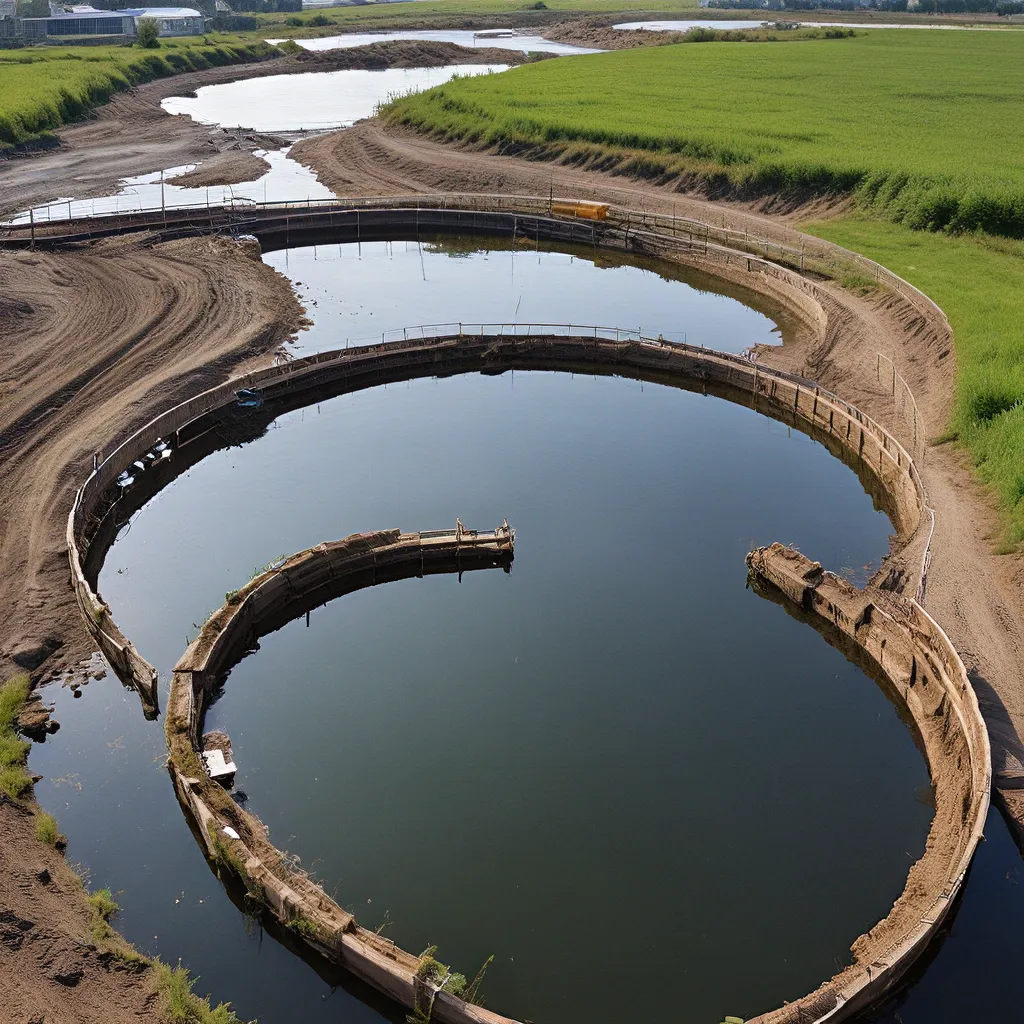
As we navigate the complex landscape of environmental sustainability, one critical area that often flies under the radar is the remarkable potential of wastewater treatment. Far from being a mere disposal process, modern wastewater management holds the key to unlocking a treasure trove of valuable resources – from bioproducts to renewable energy. And at the heart of this transformation lies the circular economy, a paradigm shift that is poised to revolutionize the way we think about waste.
Embracing the Circular Mindset
Growing up, I always found it fascinating how nature operates in a closed-loop system, with no true “waste” to speak of. The fallen leaves decompose, providing nutrients for the very trees that shed them. The byproducts of one organism become the sustenance for another. It’s a beautiful, self-sustaining dance that we humans have struggled to emulate in our own industrial and societal structures.
But the tide is turning, and the circular economy is rapidly gaining traction as a more sustainable alternative to the traditional linear “take-make-waste” model. The idea is simple: instead of discarding valuable resources after a single use, we should recover, repurpose, and regenerate them, keeping materials in circulation for as long as possible. And when you consider the sheer volume of resources that pass through our wastewater systems every day, the potential for transformation becomes truly staggering.
Wastewater as a Veritable Goldmine
Think about it – our wastewater is teeming with all sorts of valuable components, from nutrients and organic matter to precious metals and bioenergy precursors. It’s like an untapped goldmine, just waiting to be explored and exploited for the greater good. And that’s precisely where the circular economy comes into play.
By adopting a “waste as resource” mindset, wastewater treatment facilities can transform their operations from mere disposal mechanisms to veritable production hubs, generating a diverse array of bioproducts and renewable energy sources. The US Environmental Protection Agency has recognized the immense potential of this approach, actively promoting the integration of resource recovery into wastewater management.
Unlocking the Treasure Trove
So, what exactly can we expect to unearth from this wastewater treasure trove? The possibilities are truly endless, but let’s explore a few of the most promising avenues:
Nutrient Recovery
One of the most significant byproducts of wastewater treatment is the abundance of nutrients, such as nitrogen and phosphorus. Rather than simply disposing of these essential elements, wastewater facilities can recover and repurpose them for use as high-quality fertilizers. This not only supports sustainable agriculture but also helps to close the nutrient loop, reducing the need for energy-intensive and environmentally damaging synthetic fertilizers.
Biogas and Biofuels
Another lucrative resource hiding in plain sight is the organic matter present in wastewater. Through anaerobic digestion, this organic material can be converted into biogas, a renewable and clean-burning fuel that can be used to generate electricity or even be upgraded to biomethane for use as a vehicle fuel. Numerous wastewater treatment plants have already implemented this technology, transforming their facilities into self-sustaining energy producers.
Bioplastics and Biobased Chemicals
But the treasure trove doesn’t stop there. Wastewater also contains a wealth of organic compounds that can be converted into a diverse range of valuable bioproducts, such as bioplastics, biobased chemicals, and even biofertilizers. These sustainable alternatives to conventional petroleum-based products have the potential to significantly reduce our reliance on fossil fuels and create new markets for circular economy innovation.
Water Reuse
And let’s not forget the most obvious resource in wastewater – the water itself. By treating and repurposing this precious liquid, wastewater facilities can provide a reliable source of clean water for a variety of applications, from agricultural irrigation to industrial processes. This not only helps to alleviate water scarcity but also reduces the strain on freshwater resources, contributing to a more sustainable water management system.
The Circular Economy in Action
At Alpha Wastewater Services, we are proud to be at the forefront of this circular revolution. Our team of experts has been working tirelessly to implement cutting-edge technologies and innovative processes that enable us to extract the maximum value from the wastewater we treat.
For example, we’ve partnered with local farmers to distribute our nutrient-rich fertilizers, creating a closed-loop system that benefits both our agricultural community and the environment. We’ve also invested in state-of-the-art anaerobic digestion systems, transforming our wastewater treatment facilities into self-sustaining energy hubs that generate clean, renewable power.
But we’re not stopping there. Our research and development team is constantly exploring new and exciting ways to valorize the waste resources we manage, from developing biobased chemicals to exploring the potential of recovered precious metals. It’s an endless journey of discovery, and we’re excited to be at the forefront of this sustainable revolution.
The Future is Circular
As I reflect on the incredible potential of wastewater treatment, I can’t help but feel a sense of optimism and wonder. The US government has recognized the immense value of resource recovery in wastewater management, and there is a growing momentum behind the circular economy movement.
But the truth is, we’ve only just begun to scratch the surface of what’s possible. With continued research, technological advancements, and a steadfast commitment to sustainability, I believe we can transform our wastewater systems into veritable powerhouses of bioproduction and renewable energy. It’s a future that is not only environmentally responsible but also economically viable, creating new jobs, driving innovation, and paving the way for a more resilient and self-sustaining society.
So, the next time you flush the toilet or let the water run, I encourage you to think about the hidden potential of that seemingly mundane act. Because in the world of wastewater, there’s a treasure trove waiting to be unlocked – one that holds the key to a more circular, sustainable, and prosperous future. Are you ready to dive in and explore the possibilities?